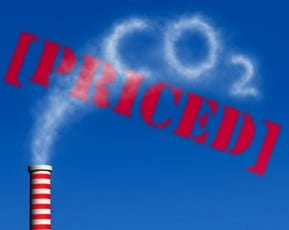Royal Dutch Shell includes a high price for carbon dioxide when evaluating new projects. The $40 a metric ton price that Shell uses would — if widely adopted — reshape domestic and international energy consumption and investment trends.
Shell discussed this policy in its 2012 Sustainability Report, but it hasn’t received much attention. CDP (aka the Carbon Disclosure Project) is putting out a report next month detailing the efforts of many companies to price carbon internally, which may help spur coverage of this important topic.
Shell explains:
Without clear measures to promote investment in more efficient and low-carbon technologies, [the world] risks setting itself on a course to potentially catastrophic climate change.
At Shell we advocate publicly and to governments that a strong and stable price on CO2 emissions will help drive the right investments in low-carbon technologies. But we are not waiting for government policy to develop. We consider the potential cost of a project’s CO2 emissions, which we set at $40 a tonne, in all our major investment decisions.
That carbon pollution price, if it were a national carbon tax, would add about $0.35 a gallon to the price of gasoline. More importantly, it would add $0.04 a kilowatt hour to the price of coal power, which would have a huge impact. Overall, that price level might cut U.S. CO2 emissions more than 20% below current levels, which are already more than 10% below 2005 levels. The vast majority of that CO2 reduction would come from a drop in coal use.
It’s worth noting that $40 a tonne price for carbon pollution also means that the harm natural gas does exceeds its value added to the economy by more than a factor of 4! With a serious (and rising) carbon price, natural gas would truly be a bridge fuel, since it would displace coal but not carbon-free sources like renewables.
The UK Guardian, one of the few outlets to cover this story, , has reported:
Shell’s carbon price was established “not to deliver major change but to demonstrate the possible” by showing that pricing carbon could drive change in a cost-effective way, according to David Hone, a climate change adviser at Shell.
Angus Gillespie, Shell’s VP for CO2 strategy said the price is designed for guiding capital allocation, given the industry’s long-term investment horizon: “It’s based on the level of mitigation that we, Shell, think is necessary to make sure that our products are robust in the long term. This is Shell internally mimicking the system we’d like to see.”
The Guardian further reports:
“There have been CO2-intensive opportunities that we have decided not to pursue because the $40 ton makes them unattractive,” he said, without naming any. At the same time, Shell has invested in carbon capture and storage projects, notably the Quest carbon capture and storage project in the Canadian tar sands, because of its belief that the technology will make sense, if regulators set a steep carbon price.
While Shell is to be commended for putting in place a serious internal or “shadow” carbon price for its own investments, it is disappointing they haven’t thought through the full implications of climate change — namely that the world needs to leave most of the fossil carbon in the ground. As Bloomberg reported Monday, the risk is in “sinking billions of dollars today into projects that will never make sense to finish.”
Yet just last month, the Canadian media reported:
Royal Dutch Shell PLC has given the green light to a new steam-driven oil sands project, putting the Anglo-Dutch oil major among a handful of companies announcing big northern Alberta energy developments in the last day.
Shell said it is going ahead with the 80,000 barrel a day Carmon Creek project in the Peace River area of Alberta. It did not give a price tag for the project in a news release on Thursday, though a spokesman said it will be in the billions, rather than millions, of dollars.
Developing the tar sands into usable fuel would be near the top of any reasonable list of projects that don’t make any sense to finish in a world where carbon pollution is priced reflect its potentially catastrophic harm to humanity.
Source: Climate Progress. Reproduced with permission










